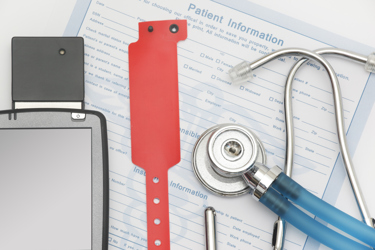RFID In Healthcare: Improving Patient Outcomes While Streamlining Operations

By John Oncea, Editor

RFID (Radio Frequency Identification) technology has significant potential in biomedical applications within the healthcare industry. It can be employed to improve patient care, enhance medical research, and streamline various biomedical processes.
RF software and design, when applied to biomedical applications, play a crucial role in advancing modern healthcare. RF technology is used in various medical devices and systems to diagnose, treat, and monitor patients with key biomedical applications including:
- Magnetic Resonance Imaging (MRI): MRI machines use powerful RF pulses and magnetic fields to generate detailed images of internal body structures. RF software is used to control the excitation and reception of RF signals in MRI systems, enabling the creation of high-resolution images used for diagnosing various medical conditions.
- RF Ablation: RF ablation is a minimally invasive procedure that uses RF energy to treat certain medical conditions, such as cardiac arrhythmias, tumors, and chronic pain. RF software is essential for precise energy delivery to the targeted tissue, ensuring effective treatment with minimal damage to surrounding healthy tissue.
- Hyperthermia Therapy: Hyperthermia therapy is a treatment method that uses RF energy to raise the temperature of targeted tissues to damage or kill cancer cells. RF software is employed to control the RF energy delivery and monitor temperature changes during the procedure.
- Wireless Capsule Endoscopy: In this non-invasive procedure, patients swallow a small wireless capsule containing a camera that captures images of the digestive tract. RF technology enables the capsule to transmit images to an external receiver, helping in the diagnosis of gastrointestinal conditions.
- RF Thermotherapy: RF thermotherapy is a technique used to treat certain musculoskeletal and soft tissue conditions. RF software helps in delivering controlled RF energy to generate heat, which promotes tissue healing and pain relief.
RFID (Radio Frequency Identification) technology has found numerous applications in various industries, including healthcare, where it is utilized to track and manage medical equipment, supplies, and even patients. It offers several advantages, but there are also some challenges to consider.
How RFID Improves Patient Outcomes
RFID technology utilizes RF signals to identify and track medical equipment, medications, and patients within healthcare facilities. RF software is essential for managing RFID systems, ensuring accurate tracking, and enhancing overall efficiency in healthcare operations.
“For example, RFID patient tracking systems with tags enclosed within wristbands can protect the vulnerable while also allowing clinicians to link every patient quickly and easily to their (electronic) notes and other relevant information,” writes The Barcode Warehouse. “Medical devices, pharmaceutical inventory, and bed availability can all be tracked in real time. The use of properly (GS1) certified RFID in healthcare can, in one swoop, reduce or remove human error, generate much more efficient workflows, and improve patient pathways and outcomes from multiple perspectives.”
RFID tags can be attached to medical equipment and supplies, allowing healthcare facilities to track their location and usage. This streamlines inventory management, reduces losses, and ensures that essential items are readily available when needed. In addition, RFID bracelets can be used to identify patients accurately and quickly. This enhances patient safety, reduces medical errors, and helps match patients with their medical records and treatments more efficiently.
RFID technology can be employed to improve workflow processes within hospitals and clinics. For instance, it can automate check-in and discharge procedures, making them faster and more efficient. RFID systems also can enable real-time monitoring of critical parameters like temperature and humidity in storage areas for medications and vaccines. This ensures that sensitive products are stored appropriately and remain effective.
The chances of a patient developing an infection can be reduced with RFID by monitoring the movement of medical staff and patients. This helps identify potential exposure risks and enables better tracking during disease outbreaks. By reducing the chances of medical errors, such as administering the wrong medication or treatment, RFID contributes to improving patient safety and overall healthcare quality.
Conversely, there are potential problems to overcome when using RFID solutions, including the fact that RFID systems can be expensive, particularly for large healthcare facilities. This cost includes purchasing RFID tags and readers and integrating the technology into existing systems.
The potential for technical issues such as signal interference, tag collisions, and limited read range exists as well, as does compatibility with existing infrastructure. The technical challenges can result in inaccuracies or delays in data capture and processing while integrating RFID technology with legacy systems in healthcare facilities can be complex and may require significant changes to the existing infrastructure.
On a personal level, RFID technology involves the use of personal data, and there may be concerns about the privacy and security of patient information. Adequate safeguards and encryption measures must be in place to protect sensitive data from unauthorized access. There are ethical concerns to consider as well, such as using RFID technology to track patients and staff continuously. Striking the right balance between convenience and privacy is crucial.
Despite the challenges, RFID technology continues to evolve and find valuable applications in healthcare. As with any technology, careful planning, implementation, and adherence to security protocols are essential to maximizing the benefits of RFID while addressing potential drawbacks. To overcome barriers, it's important to concentrate on conducting extensive financial analysis of risk benefits, thoroughly testing technology before implementation, educating staff on technology beforehand, and recognizing the importance of applying appropriate security measures.
Overall, the integration of RF software and design in biomedical applications has significantly improved medical diagnosis, treatment, and patient care, making it an essential component of modern healthcare systems.
